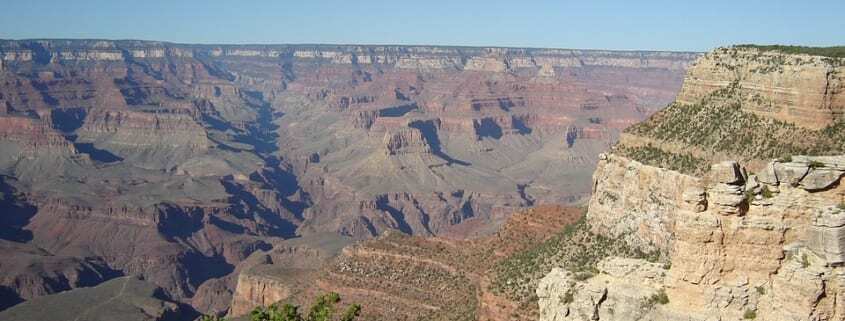McCain Brings His Senate Campaign to the Grand Canyon
Like a number of other “establishment” Republicans disenchanted with Donald Trump, the anti-establishment presidential nominee of their party, Senator John McCain skipped the Republican National Convention in Cleveland in July. Instead, he spent that week campaigning for re-election in Arizona with a series of mostly small events.
One of the places he went to campaign was the visitor’s center at the South Rim of the Grand Canyon. There, barely hiding his personal dislike for Trump—who in July 2015 had seemed to criticize McCain for being captured during the Vietnam War—McCain noted that it was “more important” to meet the voters in his home state than to attend the convention.
Competitive Race
McCain, who turns 80 in August, faces one of the most competitive races of his lengthy political career this year as he runs against his Democrat opponent, Representative Ann Kirkpatrick. The 2016 election represents his sixth campaign for the Senate seat he has held since 1987. Kirkpatrick has questioned the wisdom of returning him to the legislative body in which he has already served for such a long time. Moreover, she has often linked McCain to Trump, who the senator has reluctantly and underwhelmingly endorsed. Trump has high unfavorable ratings in Arizona, partly because of remarks he has made that are perceived as unfavorable to Mexican immigrants, who make up a large proportion of Arizona’s population.
Some public opinion polls indicate a tight race between McCain and Kirkpatrick, while others suggest McCain is maintaining a significant lead. Many political observers believe the election results could be closer than those latter polls imply, because Trump’s rhetoric might prompt a higher-than-usual turnout among Hispanic Democrat voters. However, surprisingly, some polls suggest that Trump is obtaining more support among Hispanics than previous Republican presidential nominees. Despite all the political speculation and prognostication surrounding both the senatorial and presidential races, no one will know the actual outcomes until American voters have their say in November.
Canyon Campaigning
McCain arrived at his Grand Canyon event with his wife, Cindy, in a parlor car on the Grand Canyon Railway. During the train ride, the couple refrained from campaigning with the other passengers, most of whom were from out of state. Upon arriving at the South Rim visitor center, McCain took part in a round table discussion with a group of local government officials and business leaders. Many of these officials and leaders expressed concerns over the possibility of President Barack Obama using his executive powers to designate a new national monument in the canyon’s watershed area—a move that has been criticized as potentially harmful to the local economy.
McCain noted that, in his opinion, an old government agreement that had been made with the help of the late Senator Morris Udall (Democrat, Arizona) guarantees that canyon lands are to be available for multiple uses, including the mining uses that the monument designation would ban. McCain said, “Now they’re going back on that commitment, and I think it’s disgraceful.”
“I’m worried that as this administration winds down that they will be moving toward the designation of monument status,” McCain added. “I want to promise you I am as committed as anybody in this room to preserving the beauty of our state, but this part of the state should be used for multiple use, for all the reasons that it has since people first came here.” He further noted that a Republican Administration headed by a President Trump would likely be more favorable to such multiple land uses than another Democrat Administration.
Other Stops
Another stop during McCain’s campaigning at the canyon rim was the Kolb Studio, an historic home where the photographer brothers Emery and Ellsworth Kolb lived and worked. Ranger Ron Brown noted while leading a small tour group that included McCain, “”Not everybody liked Emery. I’ve heard him described as difficult. I’ve heard him described as a mean old man.” McCain jokingly responded, “I’ve been described the same way.”
Yet another stop for McCain was a breakfast in Williams, a small town at the southern terminus of the Grand Canyon Railway. This town is most famous as the former western end of the legendary Route 66. At the breakfast, a local pastor told McCain that the members of his congregation were praying for all elected officials, even those they did not agree with. The pastor added that he was leaning toward voting for Trump for president.
McCain replied that both Trump and Democrat presidential candidate Hillary Clinton would likely have trouble gaining a broad voter mandate in November. “For the first time in political history, since they’ve been taking polling, the two major candidates have larger unfavorable opinions held by the American people,” he said. “If the American people don’t trust you, then how do you unite the country?”

 https://pixabay.com/en/grand-canyon-south-rim-usa-1758807/
https://pixabay.com/en/grand-canyon-south-rim-usa-1758807/